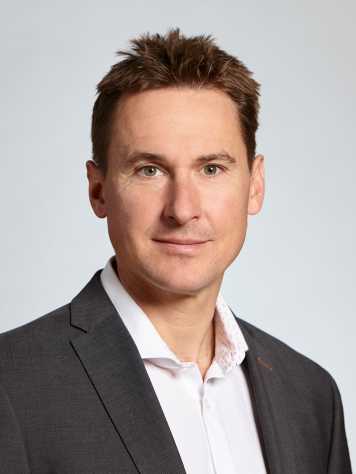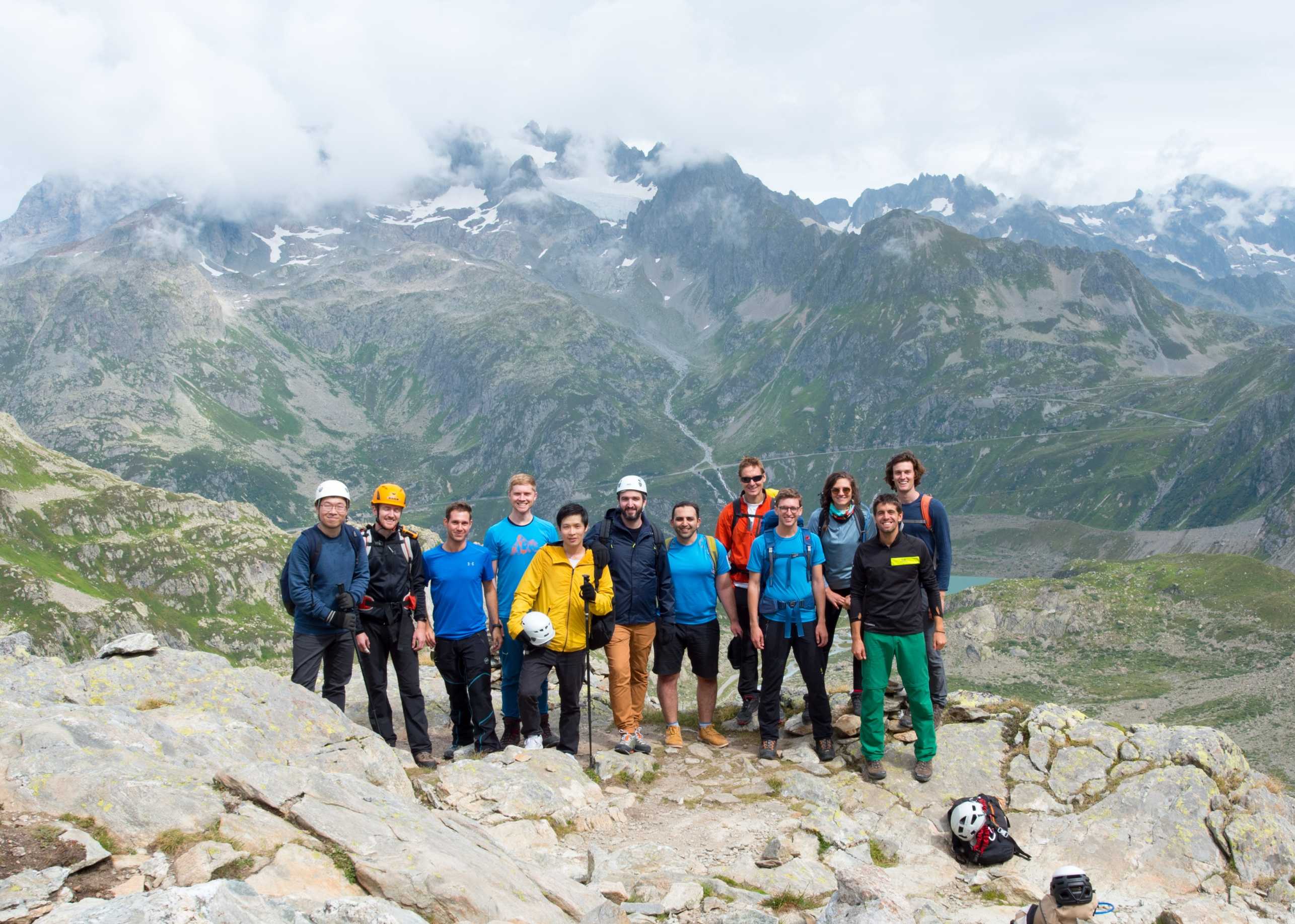"Nothing is more practical than a good theory"
Florian Dörfler is professor at the Automatic Control Laboratory (IfA). In our interview, he explains why systems control has been the "backbone" of all automation for decades. For him, today is the most exciting time in the history of his field of research.

Prof. Dörfler, what is your main area of research?
The core of my work is the concept of feedback between the real world and the virtual world of algorithms. On the one side of this feedback loop, we design an abstract model of the real world from data and determine its state from real-time measurements. On the other side, we influence the real world again based on this information and based on algorithms. Hence, we close a loop between the real and the virtual world.
Take the cruise control in your car as an everyday example: this is a feedback loop that automates one of your tasks as a driver. Speed measurements are fed into an algorithm which – based on a model of the car and a reference value for the speed – decides whether to accelerate or brake. The algorithm's decision, in turn, is transferred directly to the car via the gas supply.
My field includes systems control, i.e. the design of the mentioned feedback algorithms, and system theory, meaning the abstraction of the world in feedback loops. We also use and develop methods of optimisation, machine learning, game theory, signal processing etc.
What brought you to this field? Why does it fascinate you?
When I finished school I originally wanted to study mathematics, but it was supposed to be "useful" mathematics – whatever that means to a high school student. I had heard by chance about the study programme of Engineering Cybernetics, which I found very interesting, partly because of the name. But I did not really understand the big picture until my 5th semester.
However, at the end of my studies, after nine semesters of systems control, system theory, dynamics, optimization, and their applications, I was fascinated and convinced by the systems-theoretic perspective and approach: It combines mathematical precision and elegance with practical usefulness - true to the motto "Nothing is more practical than a good theory".
After this rather random entry in the field, I tried my hand at research and was lucky to meet a number of excellent mentors. Today, my fascination for this field is still undiminished!
What is the impact of your research on society?
The results of my field of research are mostly a "hidden technology": Nothing in our highly technological and automated world would work without systems control, but this is rarely the focus of attention. It is the backbone of all automation, so to speak.
My research is mainly applied to energy systems, including the development of smart grids: how can we create a world with 100% renewable energy sources? This is an exciting and incredibly urgent question. My area of expertise lies at the heart of most of the solutions, for example in the automation of buildings, coordination of thermal loads, grid-forming inverters, optimisation of network flows and so on. My field provides the methods and also acts as the lingua franca that mediates between different areas. We are in a very strong position on these topics in Switzerland, at ETH and especially at D-ITET.
In addition, I have also been dealing with problems from sociology and economics recently. For example: How can one abstract the process of opinion formation within a social network, how can one model opinion manipulation, for example through "fake news", in such a network, and where does the network actually come from? These are both classic and contemporary questions that can be reassessed today with quantitative, data-based methods.
Finally: A large part of my research is also pure theory, e.g. how can machine learning be integrated into the feedback loops mentioned above? The theoretic solutions we develop to such questions have no direct influence on society here and now, but perhaps in 20 years' time many technologies – such as autonomous cars – will rely on such approaches.
“"Nothing in our highly technological and automated world would work without systems control, but this is rarely the focus of attention. It is the backbone of all automation, so to speak."”Prof. Florian Dörfler
And what are currently the biggest challenges in your field of research?
My field is largely mature and has countless applications and success stories to show for it: It has been a key technology from the moon landing to today's cyber-physical systems. Nevertheless, I think that here and now is the most exciting time in the history of systems control. I personally see three major directions:
First, there are the so-called "complex systems": Think of infrastructures such as the electricity grid, the Internet, or traffic. Systems theory offers a unique – perhaps even the only – approach towards these huge, networked, and complex cyber-physical systems.
Secondly, I see a lot of potential for the future at the interface with computer science which has developed many advances in machine learning, formal methods, and distributed algorithms that find applications in control. The time is ripe for the two communities to join forces and address some urgent scientific challenges in their intersection, e.g. autonomous driving.
Thirdly, my discipline is still one of the most important "service sciences" within engineering and also outside it, for example, in synthetic biology. Although almost all engineers are well trained in the application areas, "cutting-edge" problems will still require specialists from my field to develop tailor-made solutions. The problems from the applications in turn inspire new theoretical research. In short, theory cannot exist without application and vice versa.
Our new National Centre of Competence in Research, the external page "NCCR Automation" under the direction of Prof. John Lygeros, also carries out research in these three areas.
What is a smart grid?
The electricity grid has been undergoing an unprecedented transformation for several years, mainly by adding a variety of renewable and decentralised energy sources, such as solar and wind energy. These energy sources in turn have to be controlled and coordinated with each other, which for the most part is done digitally. This process of digitalisation and automation now makes the grid "smart", in contrast to the previous electricity grid, which was based on physical design.
How do you like ETH as a research institution?
The freedom to do research "into the blue" is ETH's greatest trump card and the aspect I like best here. Only research that is free of constraints and pressure can lead to truly innovative results. I have been at top universities in the USA before, and there you have much more financial pressure. The major research directions are dictated by funding agencies, and even within the university you have a lot more administrative tasks that are taken over by experts here. In short, ETH Zurich gives you the time, the resources, and the "fool's licence" to conduct truly innovative, cutting-edge research.
Are you collaborating with other people at D-ITET or other departments at ETH Zurich?
I have most collaborations within my building, the ETL: in the field of systems control especially with Prof. John Lygeros, and in the field of energy especially with Prof. Gabriela Hug. I also regularly engage in discussions and exploratory talks with other researchers within and outside the department who also have a systems-theoretic view of the problems in their field: for example Prof. Laurent Vanbever at D-ITET and colleagues within robotics, sociology, computer science, optimisation, traffic engineering, and dynamic systems. In the meantime, a few joint articles and co-supervised doctoral students have emerged from these discussions.
How international is your group? Are you currently looking for doctoral students?
My group is a colourful mix of people, half of whom are European, the other half currently coming from North America, Iran and China. Currently I don't have an open position for a specific topic, but we always have an open ear for very good and motivated applications.

What courses are you teaching this semester?
At the moment, I am teaching the Bachelor's course "Regelungstechnik I" about the basics of my subject which I enjoy very much. Next semester I will probably give the Master's lecture "Distributed Systems and Control".
Will the Corona crisis have a lasting effect on teaching and research?
In my particular case, I thought somewhat naively that the corona crisis would not affect my lecture, as it had already been completely digitalised for years with videos, digital board notes, slides, EDUApp etc. However, this was a bit short sighted, and I noticed that we have to compensate for the lack of personal interaction via tools like digital Q&A, online forums, "flipped classroom" for exercises, "take-home coding projects" and so on. All this has worked well so far and is a good model for the future to give access to teaching to students who cannot be in Zurich or have scheduling conflicts during the lecture period.
Professors at D-ITET
In our interview series, professors at D-ITET give an insight into their research and personal motivation to go into academia.